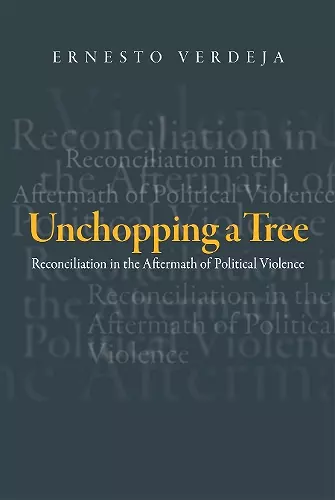Unchopping a Tree
Reconciliation in the Aftermath of Political Violence
Format:Hardback
Publisher:Temple University Press,U.S.
Published:15th Oct '09
Currently unavailable, and unfortunately no date known when it will be back

Political violence does not end with the last death. This title develops a critical justification for why transitional justice works and outlines a concept that emphasizes the importance of shared notions of moral respect and tolerance among adversaries in transitional societies.A significant new examination of the possibilities of reconciliation after wars and genocide
"Discussions of social reconstruction after political violence commonly expose the psychological and moral obstacles to forgiveness of perpetrators by victims. Ernesto Verdeja's Unchopping a Tree, in contrast, offers a sustained and clarifying analysis of respect and thus moves beyond forgiveness as the key to personal and political reconstruction after mass atrocities. The integration of personal narratives into the conceptual analysis makes this an especially valuable treatment of the daunting and demanding challenges for societies recovering from violence."
—Martha Minow, Harvard University, author of Between Vengeance and Forgiveness: Facing History after Genocide and Mass Violence
"I am greatly impressed by Unchopping a Tree. Ernesto Verdeja manages to synthesize an enormous amount of material into a clear and cogently argued framework to guide thinking about processes of reconciliation. He does an excellent job of presenting what he finds to be the strengths and weaknesses of the competing major approaches to this topic on the way to constructing and defending his alternative. His style is both pedagogic and clear-sighted. I think this will be an important work that makes a clear contribution to the literature."
—Ron Eyerman, Yale University, author of Cultural Trauma: Slavery and the Formation of African American Identity
"Verdeja has written an excellent book that should be recognized as an important contribution to current debates on reconciliation. It provides a much-needed comprehensive and multilayered normative perspective, and it will be of great value to our global concern with the question of how societies can deal with an atrocious past."
—Thomas Brudholm, University of Copenhagen, author of Resentment’s Virtue: Jean Améry and the Refusal to Forgive
ISBN: 9781439900543
Dimensions: 210mm x 140mm x 20mm
Weight: unknown
240 pages